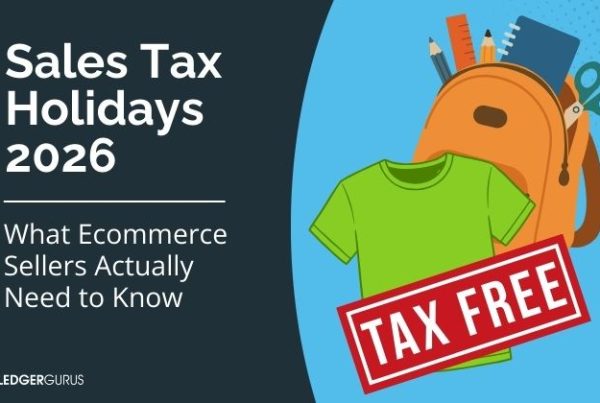
Estimated reading time: 4 3/4 minutes
Update: As of July 1, 2024, the Colorado Retail Delivery Fee has been increased to $.29 on retail deliveries into the state.
When it comes to sales tax, Colorado is one of the most difficult states not only because of regular state, county, city and special district taxes but also because of home rule cities (which means each has its own definition, tax rates, taxability, registration and filing portal) and now the Colorado Retail Delivery Fee.
Sounds complicated, right? Well, you’re in the right place.
As ecommerce accountants, we work with this stuff every day, and we’re here to make it easier for you.
Key Takeaways
- The Colorado Retail Delivery Fee has increased. As of July 1, 2024, Colorado’s delivery fee is $.29 for retail deliveries, applied to any taxable, tangible item delivered by motor vehicle within the state.
- Who Pays the Fee? Retailers with over $500K in annual Colorado sales or a physical presence in the state must collect and remit the fee, while marketplace facilitators like Amazon handle it for their sellers.
- How to Set Up Compliance: Retailers must set up a separate account with Colorado’s Department of Revenue and file Form 1786 with their regular sales tax return.
- Need Help? LedgerGurus offers consultations, training, and full management services to help retailers stay compliant with Colorado’s Retail Delivery Fee and other sales tax obligations.
Table of Contents
- Key things you need to know about the Colorado Retail Delivery Fee details, including updated costs
- Which retailers are liable for this fee?
- How does this affect sales made through a marketplace?
- How to get a retail delivery fee account
- How does the Colorado Retail Delivery Fee compare with the Minnesota Retail Delivery Fee?
- How to get help if you’re still unsure how to deal with this fee
Key Things You Need to Know About the Colorado Retail Delivery Fee
Starting on July 1st, 2022, Colorado introduced a fee on retail deliveries into the state, requiring retailers to collect and remit a retail delivery fee if the transaction meets the following criteria:
- The delivery contains at least one item of tangible personal property, and is subject to state sales or use tax.
- The products are delivered to Colorado customers by motor vehicle (i.e. road transportation).
The fee started at $.27, but has increased to $.29 as of July 1, 2024.
- $.27 – July 1, 2022 – June 30, 2023
- $.28 – July 1, 2023 – June 30, 2024
- $.29 – July 1, 2024 – June 30, 2025
And there’s a good chance it’ll go up again in 2025.
The Retail Delivery Fee is not subject to state sales tax or state-administered local sales tax, but may be subject to sales tax in self-collecting home rule jurisdictions.
If you want to know more about sales tax for home rule jurisdictions, here is a video explaining how sales tax works in the home rule jurisdictions.
Important Details about the Retail Delivery Fee to Keep in Mind
- The fee is not refundable, even if the items are returned.
- The fee still applies to purchases with free shipping, as long as at least one item of tangible personal property is included.
Which Retailers are Liable for this Fee?
You don’t need to worry about it unless you DON’T meet these criteria, which qualify you for an exemption:
- A business whose retail sales of tangible personal property or taxable services in Colorado totaled less than $500K in the previous year.
- A business that is not liable for sales tax because they have no physical presence in Colorado.
Note: The small business exemption threshold for the Retail Delivery Fee is far higher than the economic threshold for sales tax ($100K). Don’t get them confused.
Another thing to note is that you can choose to pay the fee yourself instead of adding it to the checkout process. This has been an issue because the software that retailers use often does not allow an extra line item to be added.
How Does this Affect Sales Made Through a Marketplace?
This is a really common question. Basically, who is responsible for collecting and remitting this fee when sales are made through a marketplace?
We found this specific guidance on who liable for the retail delivery fee on the Colorado Department of Revenue website.
“If a retail sale is made through a marketplace and the marketplace facilitator (such as Amazon, eBay, etc) is required to collect sales tax from the purchaser, the marketplace facilitator is also liable for the retail delivery fee if the purchased item is delivered by motor vehicle. A marketplace seller who is not liable for sales tax on the sale is also not liable for the retail delivery fee.”
So for those of you selling on Amazon or Etsy, etc., this definitely makes things easier for you.
How to Get a Retail Delivery Fee Account
If you already file sales & use tax in Colorado, you must open a separate Retail Delivery Fee account with the Department of Revenue.
Things to note:
- The form for filing the Retail Delivery Fee is Form 1786. You can file online or by paper. The form is pretty straightforward, but feel free to reach out to us if you have any questions.
- This fee is NOT the same thing as sales tax, but filings are due at the same time as your sales tax return.
- For example, if you are a monthly filer for sales & use tax in Colorado, you will also be a monthly filer for the Colorado retail delivery fee reporting and remittance.
- There are penalties and interests for late filing.
- The Retail Delivery Fee applies state-wide and does not need to be separated by jurisdiction.
How Does the Colorado Retail Delivery Fee Compare to the Minnesota Retail Delivery Fee?
There are a couple of key differences:
- Colorado’s fee is $.29 (for now) while Minnesota’s RDF is $.50.
- Colorado’s fee applies to any retail transaction with at least 1 item of taxable, tangible personal property while Minnesota’s is on retail transactions over $100.
- Colorado’s sales threshold for sellers is $500K in the previous calendar year while Minnesota’s is $1M.
If you want more information about Minnesota’s Retail Delivery Fee, click here.
Are You Still Unsure How to Deal with This Fee? How to Get Help
The Colorado Retail Delivery Fee is just one example of changing tax laws that you have to stay on top of.
Are you tired of trying to figure it out on your own? Here are some of the ways we can help:
1. Consultation: When you have questions, a consultation with one of our sales tax experts may be your best choice. We can answer them, walk through processes with you, and even help you fill out forms correctly.
2. Sales Tax Masterclass: If you want to understand the ins and outs of sales tax so you can do it yourself, we have a free masterclass you can watch called The Uncomplicated Truth about Sales Tax.
3. Managed for You: Would you rather just have someone take care of the whole thing for you so you can focus on growing your business? Consider LedgerGurus. We have a team of sale tax experts who do this every day. We will be happy to handle it for you. Click here to get in touch with us.
Also, we send out a weekly newsletter highlighting the most important financial happenings and news articles in ecommerce and business in general. Stay informed by subscribing to our “Weekly Top 3” newsletter.






